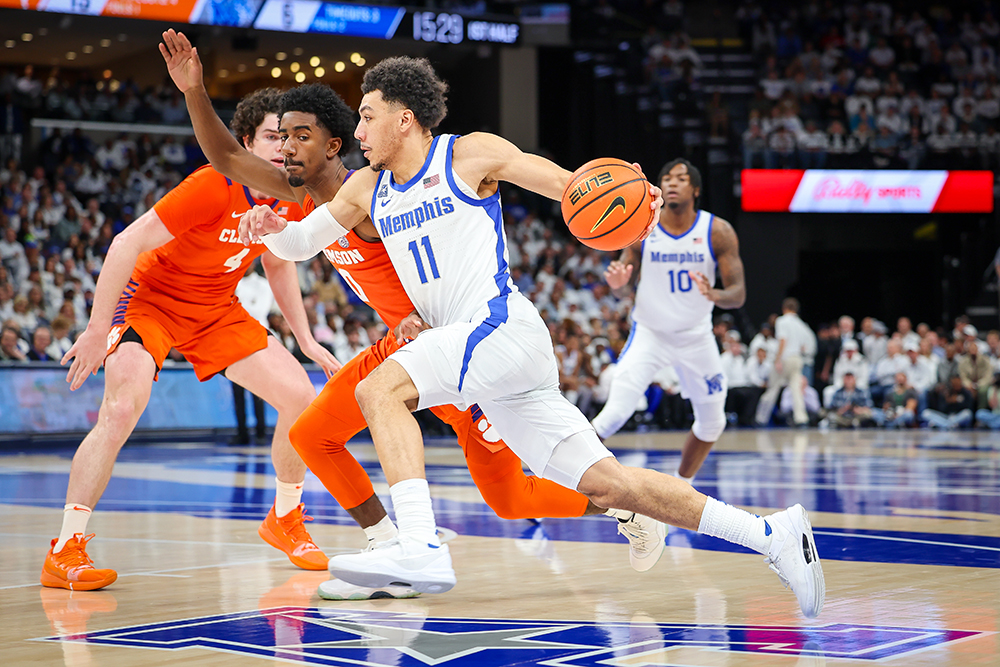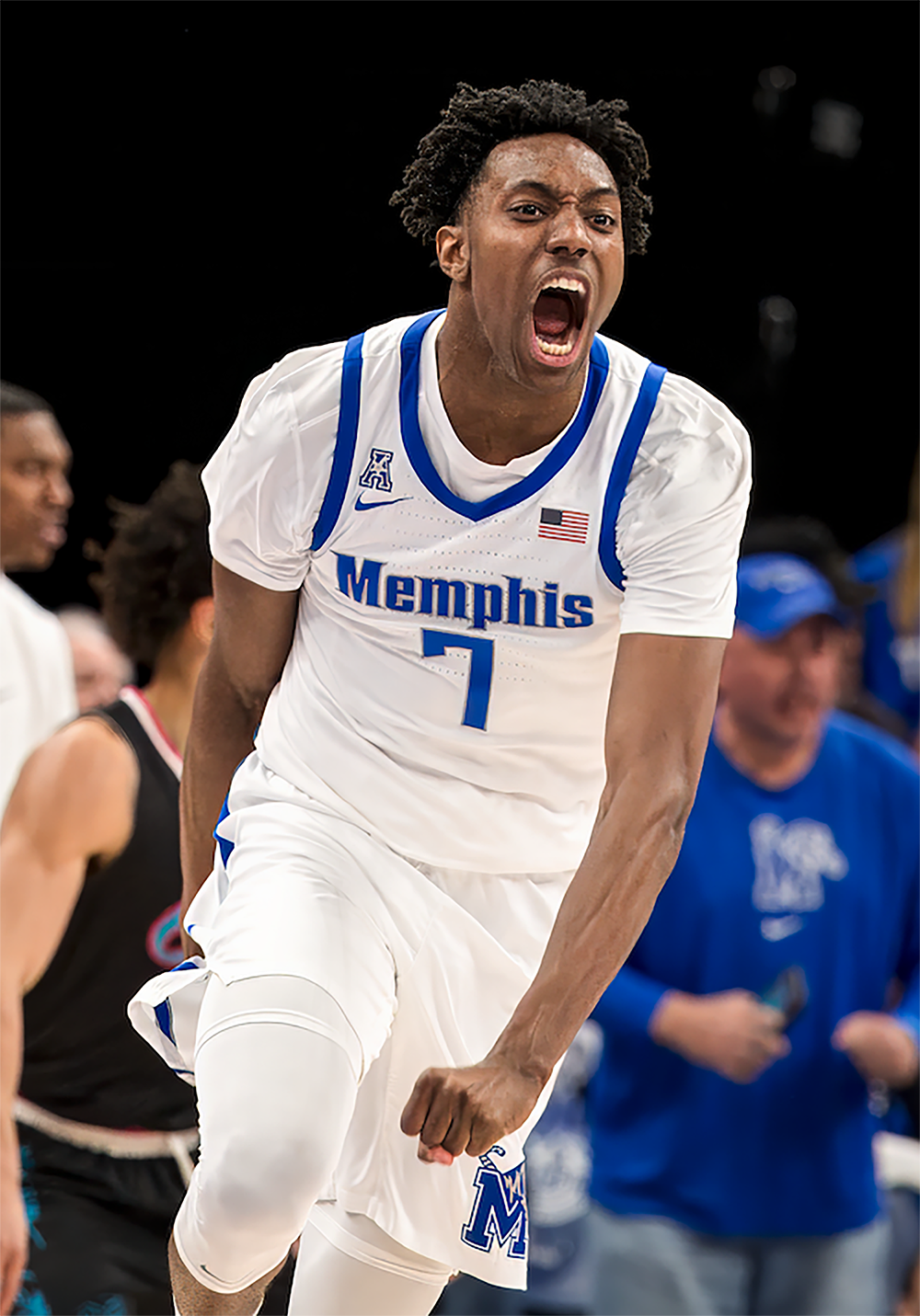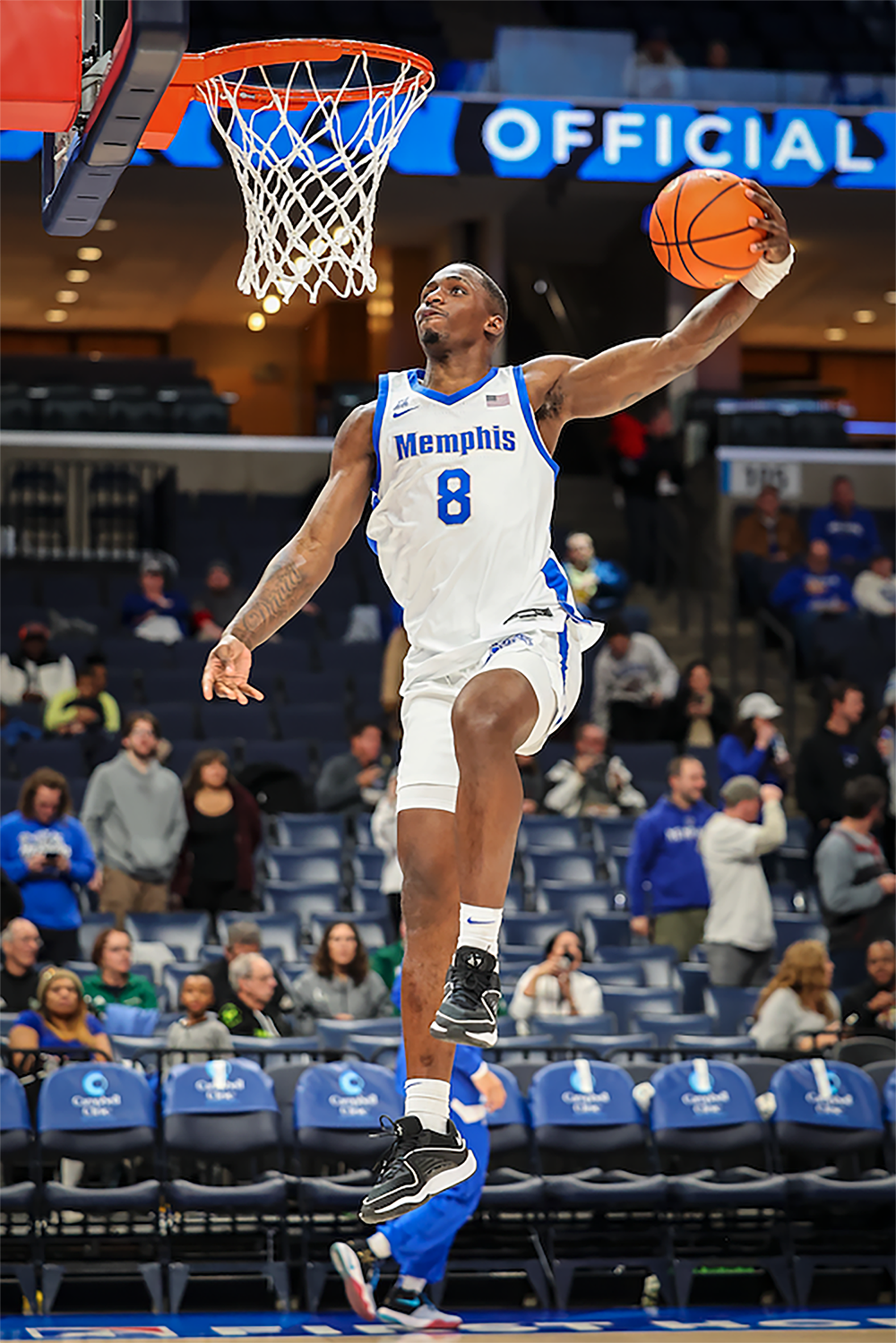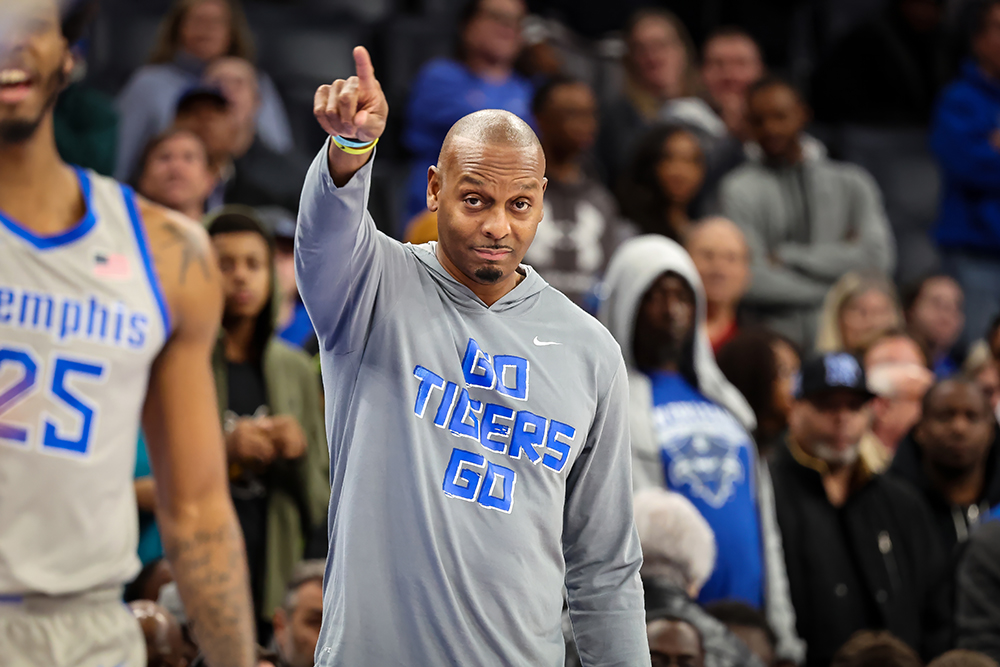I’m appreciative of the people who have stood by us through these hard times. You can pinpoint a lot of things, but the one thing I do know: God doesn’t make mistakes. All of the negativity through this entire thing … these are still kids. They can have a bad day, a bad game, a bad week. That doesn’t mean there’s a disconnect between coach and players because you’re losing. Everything gets heightened here in Memphis. I was chosen to do this, not by the University of Memphis but by God, honestly. I took this job when it was at its lowest moment. I only want to do well for the city. I’m going to be hardest on myself. It guts me, because I want our city to be known for something other than what it’s known for. These are some tough times. Everybody has an opinion. But I know God has a plan, and there’s a plan for this team. I’m happy that I’m coaching this team. — University of Memphis basketball coach Penny Hardaway, after the Tigers ended a four-game losing streak with a win over Wichita State
On February 3rd at FedExForum, the Memphis Tigers found themselves down 14 points with less than 10 minutes to play against the supposedly inferior Wichita State Shockers. A loss would give a proud program not only its first five-game losing streak in six seasons under coach Penny Hardaway, but the program’s first five-game losing streak in 24 years.
Point guard Jahvon Quinerly — a senior transfer from Alabama — came to the rescue with a three-pointer to give Memphis its first lead of the game with 44 seconds on the clock. (It was the only field goal Quinerly made on an otherwise forgettable afternoon.) After the Shockers evened the score with a free throw, David Jones — a senior transfer from St. John’s — buried a short jumper from the left wing to snatch a Tiger win, as they say, from the jaws of ugly defeat. Losing streak over. A season that found the Tigers ranked 10th in the country merely three weeks earlier had been somewhat saved. At least until the next tip-off. The season has seen dreadfully ugly losses (at SMU) and the kinds of wins that seem to lift an entire region (the “get-back” over FAU in late February).
Like any decent Hollywood production, a college basketball season has a setup (nonconference play), a confrontation (league competition), and a resolution (postseason). This winter’s Tiger flick has, at times, made the popcorn tasty and, at others, forced fans to hurl the bucket in disgust. All with a resolution yet to come.

THE SETUP
In over a century of Tiger basketball, never had Memphis run a nonconference gauntlet like the one Hardaway scheduled for last fall. Seven teams from power conferences (ACC, SEC, and Big 10) plus a showdown with Villanova (national champions in 2016 and 2018) in the championship of the Battle 4 Atlantis in the Bahamas. Making the challenge even greater, four of these teams took the floor against Memphis ranked among the country’s top 25. (For perspective, nonconference foes in 2017-18 — Tubby Smith’s final season as coach — included Northern Kentucky, Mercer, Samford, Bryant, and Albany.)
The Tigers beat 20th-ranked Arkansas in the Bahamas. They beat 21st-ranked Texas A & M. They beat 13th-ranked Clemson. They beat 22nd-ranked Virginia. They handled Michigan, Missouri, and Vanderbilt. Before the year turned, Hardaway and his team seemed to have grabbed a national microphone and collectively screamed, Look at us!
“I love winning close games,” said Hardaway after a two-point victory against Vanderbilt at FedExForum, the fifth in what would become a 10-game winning streak. “They make you tougher.” And the Tigers were masters of the nail-biter early this season: four points better than Michigan, five better than Arkansas, two better than Clemson, overtime escapes against VCU and UTSA. Quinerly drilled game-winning three-pointers near the buzzer in consecutive wins over Tulsa and SMU. Jones earned some national spotlight with 36 points against Arkansas, a performance that launched him onto the short list for the Julius Erving Award, given to the top small forward in the country.
“We never said it was going to be easy,” stressed Hardaway after the SMU win on January 7th. “The rest of the nation thinks it’s going to be easy in this conference. I have so much respect [for the American Athletic Conference]. These kids are capable. They read the clippings about us and [league favorite] FAU. It’s more than a two-bid league. Adversity is okay; you can learn from it.”
On January 15th, a day after the Tigers eviscerated Wichita State in Kansas for their tenth straight win, the Associated Press released its weekly poll and there was Memphis at number 10 in the entire country, the program’s highest ranking so late in a season since 2009, when one John Calipari stomped the sidelines. The nine programs above Memphis? If you pay attention to college hoops, they’re familiar: UConn, Purdue, Kansas, North Carolina, Houston, Tennessee, Duke, Kentucky, and Baylor. (Six of these programs have won at least one national title since 2012.) If the Memphis program was indeed screaming into that proverbial national microphone, the right folks were listening.

THE CONFRONTATION(S)
Then came the freeze. The Tigers took the floor against USF on January 18th in a virtually empty FedExForum. That week’s winter storm had left Memphis streets so icy that the U of M actually released a statement advising fans to stay home (in which case ticket-holders could exchange for a later game). The Tigers raced out to a 20-point lead … before the team from South Florida made things that much colder, earning a 74-73 upset with a late-game comeback.
Three days later in New Orleans, another supposedly undermanned squad knocked off Memphis when Tulane won, 81-79. A week later in Birmingham, old rival UAB beat the Tigers, and rather easily (97-88). But the three losses that knocked the Tigers out of the Top 25 were merely prelude to January 28th, when the Rice Owls — 7-13 at tip-off, and 1-6 in the AAC — beat Memphis on its home floor.
For 17 games, the Tigers had played with a swagger, if not quite the flash, that reflected their coach’s All-NBA playing days with the Orlando Magic. They won 15 of those games. Then suddenly, shortly after the year turned, shoulders seemed to collectively slump, and Hardaway alluded to discontent between players. When asked about his team’s precipitous drop in confidence after the Rice loss, Hardaway had this to say: “That’s player-led. I’m trying my best, going to games, going to practice, talking about the pride we need to have, to have more fun playing defense, to communicate. It just seems like there’s a huge disconnect with this group right now. I can’t put my finger on it. You can tell in our play. When the game starts, the energy isn’t there.”
Following their second win over Wichita State (and the end to that four-game losing streak), Quinerly shared some perspective on what he hoped was a team-culture shift. “We didn’t have any player meetings,” he noted, “but you could tell the communication and the focus was different at our practices and film sessions. You could feel the tension in the air. Guys were super locked-in. It showed. We guarded the ball better [against the Shockers].”
Victories over Temple and Tulane followed, but then came a mid-February trip to the Lone Star State and double-digit losses to both North Texas and SMU (the latter a 106-79 mockery of the Tigers’ win over the Mustangs at FedExForum in early January). On February 24th, the university announced an inquiry involving fifth-year senior Malcolm Dandridge, sidelining an important member of the Tiger rotation entering the most important stage of the season. Memphis partially avenged its 2023 NCAA tournament loss to FAU the very next day. Ups and downs. Downs and ups.
How and why did a team mentioned as a Final Four contender in mid-January fall so precipitously, and so fast? You might start with a pair of hideous defensive measures. Through the end of the regular season, Memphis ranks 348th in three-pointers allowed: 9.1 per game. (This is according to College Basketball Reference, which tracks 362 teams in Division I.) And the Tigers rank 359th in offensive-rebounds allowed: 12.8 per game. These are effort stats. Bottom line: The Tigers haven’t guarded the perimeter and they haven’t hit the glass. In other words, they do a lot of standing and watching on defense. It’s murder on a team’s Final Four chances.
And there’s luck. Had Quinerly not hit those buzzer-beaters against Tulsa and SMU, there may not have been a 10-game winning streak or Top-10 ranking. Right player, right time, right moment … until the same player often looked like the wrong player, in the wrong time and moment. If you’re looking for a mercurial personification of a mercurial team, sadly, it’s Jahvon Quinerly.
Not to be discounted in the Tigers’ plight is the loss of Caleb Mills, yet another senior transfer (from Florida State and, before that, Houston) who suffered a catastrophic left-knee injury at Tulsa on January 4th. The team’s best perimeter defender and cultural “glue guy,” Mills embraced a role off the bench and contributed mightily in the Tigers’ four upsets of ranked teams. “I didn’t know Caleb’s magnitude until he went down,” said Hardaway in early February. The Tigers were 12-2 with Mills on the floor and have gone 10-7 without him.
If the loss of Mills exposed a susceptible Tiger rotation, the addition of Nae’Qwan Tomlin — a 6’10” midseason transfer from Kansas State — may have rescued that rotation’s integrity. (Mills and Tomlin only played three games together.) Tomlin’s ability to impose himself on both ends of the floor while providing visible, emotional energy has called to mind the play of former Tiger DeAndre Williams, the all-conference forward who completed his eligibility with the 2022-23 season. He earned Player of the Week honors from the AAC for his impact in wins over Charlotte and FAU in late February. Furthermore, Tomlin has a strong March track record, having helped the Wildcats to the Elite Eight of last year’s NCAA tournament. “He’s a big part of what we’re doing, moving forward,” emphasizes Hardaway. “We need his scoring ability, his rebounding ability, and his shot-blocking.”
However the Tigers’ postseason unfolds, Jones will leave a historic mark on the program. He’s the second consecutive Tiger (after Kendric Davis) to lead the AAC in scoring and earned first-team All-AAC recognition. He’s the only player in the country to average 21.0 points, 7.0 rebounds, and 2.0 assists and with 26 more points will become only the seventh Memphis player to score 700 in a single season. Jones is among five finalists for the Julius Erving Award, given to the nation’s top small forward.
THE RESOLUTION?
How does this four-month movie — to this point, a tragidrama — conclude before the credits roll? The happiest scenario has the Tigers banding together around their star trio (Jones, Quinerly, and Tomlin) and winning four games in four days at the AAC tournament this week in Fort Worth for an automatic berth in the NCAA tournament. Once in the field, a rocky regular season would be forgotten in exchange for hopes of a glass slipper that leads to the Sweet 16 (at least). Hardaway teams have done this before, both last year when the Tigers knocked off top-ranked Houston to win the AAC crown and in 2021 when Memphis won a scaled-down NIT in North Texas.
A more likely scenario is a win or two this weekend and a return to the NIT, college basketball’s sock hop for those without prom tickets. Not the kind of consolation anyone near the Memphis basketball program will embrace. “God has a plan for this team,” said Hardaway after the Tigers erased a 22-point deficit and beat UAB by 19 on March 3rd. “For all we’ve gone through, I never gave up. … We have a better resume than all these teams: first four out, next four out. I don’t understand why our name isn’t up there. We’ve won enough big games for us to be in the conversation. We have some great wins.”
Remain in your seats, Tiger fans. However this season ends, it’s become clear we don’t want to miss it.

The 700 Club
David Jones hopes to become only the seventh Tiger to score 700 points in a single season.
* Larry Finch — 721 (1972-73)
* Penny Hardaway — 729 (1992-93)
* Dajuan Wagner — 762 (2001-02)
* Chris Douglas-Roberts — 724 (2007-08)
* Jeremiah Martin — 708 (2018-19)
* Kendric Davis — 744 (2022-23)
* David Jones — 674 thru March 10th
